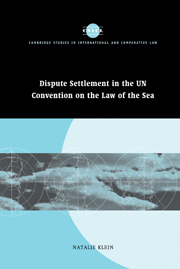Book contents
- Frontmatter
- Contents
- Acknowledgements
- List of Abbreviations
- Table of treaties and other international instruments
- Table of cases
- 1 Introduction
- 2 The Dispute Settlement Procedure under UNCLOS
- 3 Limitations on Applicability of Compulsory Procedures Entailing Binding Decisions
- 4 Optional Exceptions to Applicability of Compulsory Procedures Entailing Binding Decisions
- 5 Deep Seabed Mining
- 6 Conclusion
- Bibliography
- Index
- CAMBRIDGE STUDIES IN INTERNATIONAL AND COMPARATIVE LAW
3 - Limitations on Applicability of Compulsory Procedures Entailing Binding Decisions
Published online by Cambridge University Press: 04 July 2009
- Frontmatter
- Contents
- Acknowledgements
- List of Abbreviations
- Table of treaties and other international instruments
- Table of cases
- 1 Introduction
- 2 The Dispute Settlement Procedure under UNCLOS
- 3 Limitations on Applicability of Compulsory Procedures Entailing Binding Decisions
- 4 Optional Exceptions to Applicability of Compulsory Procedures Entailing Binding Decisions
- 5 Deep Seabed Mining
- 6 Conclusion
- Bibliography
- Index
- CAMBRIDGE STUDIES IN INTERNATIONAL AND COMPARATIVE LAW
Summary
The regulation of the uses of the oceans has demanded a high degree of cooperation between States in order to formulate a system that meets the needs and expectations of the greatest number of users. This regime requires an accommodation of both inclusive and exclusive interests – a balance between the freedoms of the high seas and certain economic rights inhering to coastal States. The far-reaching implications of oceans policies within the internal affairs of States have created a sufficient incentive for States to participate in an international regime and to transfer a certain degree of authority to the operation of the international system. Through participation, States may both control the interpretation and application of rules and standards as well as expect a certain degree of protection from the way that external control may be manipulated. This approach is manifest in the dispute settlement mechanism in Part XV. The dispute settlement procedures are intimately linked to the elaborate legal relationships set forth in UNCLOS, yet the necessity for dispute settlement procedures in relation to the normative framework of the Convention varies depending on the particular issue area in question. The complicated formulation of exceptions and limitations to the mandatory procedures established in the Convention indicates when dispute settlement is necessary for the functioning of the substantive rules. Also evident is when matters had to be left outside the purview of third-party adjudication and arbitration in favor of non-binding international processes, political settlement or unilateral decision-making.
- Type
- Chapter
- Information
- Dispute Settlement in the UN Convention on the Law of the Sea , pp. 125 - 226Publisher: Cambridge University PressPrint publication year: 2005



